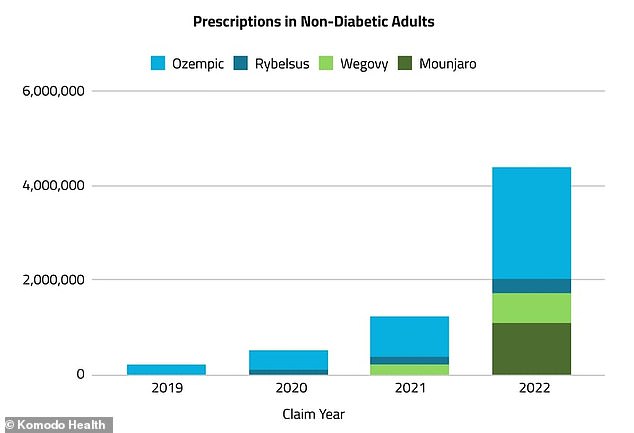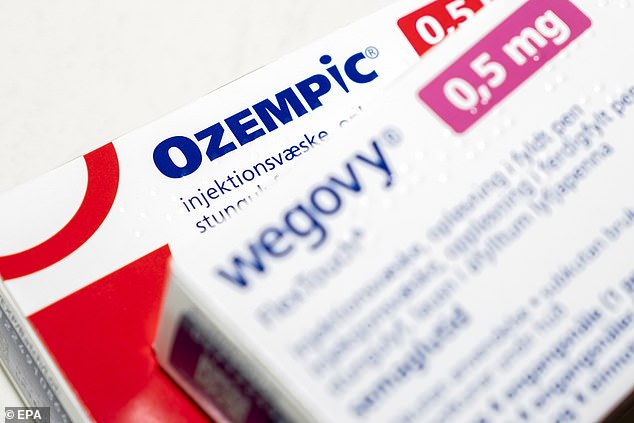THIRTEEN new Ozempic-like drugs are coming in the coming years as part of the weight loss gold rush
NovoNordisk is testing the compound CagriSema, which consists of semaglutide and cagrilintide
Drugmakers are cashing in on the success of breakthrough obesity drugs with plans to bring a further 13 treatments to market in the coming years.
Starting this year, the number of new obesity drugs coming to market will begin to increase, reaching an expected peak in 2027 with four new launches that year alone.
Pharmaceutical giant Novo Nordisk, the company behind Wegovy and Ozempic, expects to launch six products in the next five years.
Leading the pack of new drugs will be CagriSema, a combination of the key ingredient in Wegovy and Ozempic with another drug, cagrilinitide.
Novo’s main competitor, Eli Lilly, maker of Mounjaro and Zepbound, and a few other companies are expected to follow suit to meet staggering demand driven by record-high obesity rates in the US.

The graph shows that more than 5 million prescriptions for obesity drugs for weight loss were written in 2022, compared to just over 230,000 in 2019. A more recent analysis shows that more than nine million prescriptions for Wegovy and other injectable drugs for weight loss have been prescribed. out in the last three months of 2022
The weight loss drug market is expanding rapidly, with an expected value of $100 billion by 2030.
Jasper Morley, a pharma analyst from GlobalData, said: ‘Recent blockbuster launches have demonstrated the viability of anti-obesity drugs.
‘Consistent with the increasing patient population, it is highly likely that some of the companies producing these later entrants will receive a large return on their efforts.’
Novo’s CagriSema is expected to hit the market in 2025 and is likely to reach $7.4 billion in sales by 2029.
In addition to starting phase three testing for CagriSema, Novo has begun testing the second phase of another drug, INV-202, as well as an ultrasound therapy with GE.
Meanwhile, Lilly was working with a Chinese company called Innovent Biologics on a drug called mazdutide. Chinese regulators are currently reviewing it for approval there.
And South Korean drugmaker Hanmi Pharmaceutical and Germany-based Boehringer Ingelheim are developing their own drugs.

Ozempic and Wegovy have ushered in a rapidly growing field of anti-obesity drugs, with pharmaceutical companies big and small eager to cash in on the huge windfall for weight-loss drugs.
Other drug candidates in mid-stage development for obesity include Viking Therapeutics’ VK2735, Structure Therapeutics’ GSBR-1290 and Altimmune’s pemvidutide, Pfizer’s danugliprone, Amgen’s AMG133, also known as MariTide, and CT-996 and CT-388 from Roche.
A 2023 NBC News analysis found that more than nine million prescriptions for Wegovy and other injectable medications used for weight loss were filled in the last three months of 2022 alone.
Researchers at JPMorgan estimate that number will rise: By 2030, 30 million people are expected to use GLP-1 drugs, or about 9 percent of the U.S. population.
Obesity is a major public health crisis in the US; an estimated two in three adults qualify as overweight or obese, approximately 172 million people, and a third have crossed the line to definitively fall into the obese category.
Demand for anti-obesity drugs like Wegovy has been high since its approval for weight loss in 2021.
But production is struggling to keep up with demand, meaning many people who could benefit from the drugs and have a prescription for them cannot get them.
In many cases, doctors have prescribed Ozempic and Mounjaro ‘off label’ to people who want to lose weight but do not have type 2 diabetes – which they were originally intended to treat – contributing to deficiencies.
Celebrities have also driven demand for the drugs with shocking weight loss changes, but not all of them qualified as overweight and therefore didn’t need to take them.
This, as well as the public’s clamor for the drugs to look like their favorite stars, has also led to huge spikes in demand that have outpaced production.
